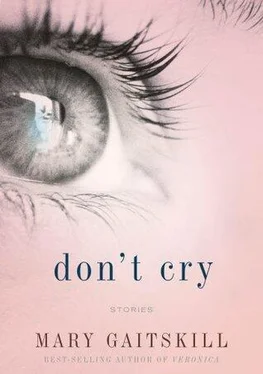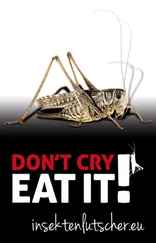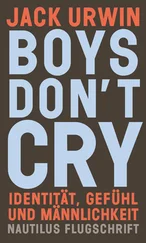Bill didn't answer because the smell of shit and garbage was up in his nose. The feel of sand was on his skin, and he had to try not to scratch it, or rub it in public like this crazy ass would surely do. Funny: The crazy ass — he should have some idea of what it was like, even if he was just supply. But even if he did, Bill didn't want to discuss it with him. All the joy you felt to be going home; how once you got home you couldn't feel it anymore. Like his buddy whose forearm had been blown off, who still felt his missing arm twitch — except it was the reverse of that. The joy was there, almost like he could see it. But he couldn't feel it all the way. He could make love to his wife, but only if he turned her over. He could tell it bothered her, and he didn't know how to explain why it had to be that way. Even when they lay down to sleep, he could relax only if she turned with her back to him and stayed like that all night.
“But that don't look like the arm or the leg. That look like the lake. Know what I'm sayin’?”
Bill looked out the window and put on his headset. It was Ghostface Killah, and he turned up the volume — not to hear better, but to get his mind away from the smell and the feeling of sand.
Like it says in the Bible, you know what I'm sayin? The white guy across the aisle laughed when he heard that, a thick, joyless chuckle. Puerile, thought Jennifer Marsh. Like a high school kid. Probably racist, too. Jennifer had marched against the war. She didn't know any soldiers; she had never talked to any. But she was moved to hear this guy, just back from war, talking so poetically about rivers and lakes. I should reach out to him, she thought. I should show support. I'll get up and go to the snack car for potato chips, and on the way back, I'll catch his eye.
The idea stirred Jennifer, and made her a little afraid. Afraid that he would look at her, a middle-aged white woman, and instantly feel her to be weak, artificially delicate, a liar. But I'm not weak, thought Jennifer. I've fought to get where I am. I haven't lied much. Her gaze touched the narrow oval shape of the soldier's close-cropped head, noticing the quick, reactive way it turned from aisle to window and back. Sensitive, thought Jennifer; delicate, and naturally so. She felt moved again; when the soldier had stood to shake hands with the guy across the aisle, his body had been slim and wiry under the ill-fitting clothes. He looked strong, but his strength was wiry and tensile — the strength of a fragile person made to be strong by circumstance. His voice was strange, and he blurted out certain words with the harshness of a sensitive person trying to survive the abrading force of the world.
See me comin’ (blaow!) start runnin’ and (blaow! blaow!) … Phantom limb, phantom joy Music from the past came up behind Ghost's words; longing, hopeful music. Many guys have come to you … His son, Scott, had been three when he left; now he was nearly five, healthy, good-looking, smart, everything you would want. He looked up at his father as if he were somebody on TV, a hero, who could make everything right. Which would've been great if it were true. … With a line that wasn't true … “Are you going to find Jack tonight, Daddy?” asked Scott. “Can we go out and find him tonight?” … And you passed them by …
“The lake is bigger — but wait. You talkin’ ‘bout the ocean?”
Jennifer's indignation grew. The soldier's fellow across the aisle was deliberately ignoring him and so, stoically adjusting to being ignored, he was talking to himself, mimicking the voice of a child talking to an adult, then the adult talking back. “The ocean is bigger than the lake,” said the adult. “The ocean is bigger than anything.”
He hadn't meant to look for Jack; the dog was getting old, and if he hadn't come back after two weeks, he must be dead or somewhere far away. But Wanda had done the right thing and put up xeroxed flyers all over their town, plus a town over in every direction. He saw Jack's big bony-headed face every time he went to the post office or the grocery store, to the gas station, pharmacy, smoke shop, office supply, department store, you name it. Even driving along back roads where people went for walks, he glimpsed Jack's torn, flapping face stapled to trees and telephone poles. Even though the pictures showed Jack as a mature dog, he kept seeing him the way he was when he got him for Christmas nine years before: a tiny little terrier, all snout and paws and will to chew shit up. He greeted Bill every day when he came home from school; he slept on his bed every night. When Scott was born, he slept in front of the crib, guarding it.
Jennifer tried to imagine what this man's life was like, what had led him to where he was now. Gray, grim pictures came half-formed to her mind: a little boy growing up in a concrete housing project with a blind face of malicious brick; the boy looking out the window, up at the night sky, kneeling before the television, mesmerized by visions of heroism, goodness, and triumph. The boy grown older, sitting in a metal chair in a shadowless room of pitiless light, waiting to sign something, talk to somebody, to become someone of value.
The first time he went out to find Jack, he let Scott go with him. But Scott didn't know how to be quiet, or listen to orders; he would suddenly yell something or dart off, and once Bill got so mad that he thought he'd knock the kid's head off. So he started going out alone — late, after Scott and Wanda were in bed. They lived on a road with only a few houses on it across from a stubbly field and a broken, deserted farm. There was no crime and everybody acted like there could never be any But just to be sure, he took the Beretta Wanda had bought for protection. At first, he carried it in his pocket with the safety on. Then he carried it in his hand.
Jennifer grieved; she thought, I can't help. I can't understand. But I can show support. This man has been damaged by the war, but still he is profound. He will not scorn my support because I'm white. As if he had heard, the soldier turned around in his seat and smiled. Jennifer was startled by his face — hairy, with bleary eyes, his mouth sly and cynical with pain.
“My name's Jim,” the soldier said. “Glad to meet you.”
Jennifer shook his proffered hand.
“Where you headed today?” he asked.
“Syracuse. For work.”
“Yeah?” He smiled. His smile was complicated — light on top, oily and dark below. “What kind of work?”
“I'm giving a talk at a journalism school — I edit a women's magazine.”
“Yeah? An editor?”
His smile was mocking after all, but it was the sad mocking men do when the woman has something and they don't. There was no real force behind it.
“I heard you talk about being in Iraq,” she said.
“Yeah, uh-huh.” He nodded emphatically, then looked out the window as if distracted.
“What was it like?”
He looked out the window, paused, and began to recite: “They smile and they say you okay / Then they turn around and they bite / With the arrow that fly in the day / And the knife in the neck at night.”
“Did you make that up? Just now?”
“Yes, I did.” He smiled again, still mocking, but now complicitous, too.
“That's good. It's better than a lot of what I read.”
Did you make that up? Just now? Stupid, stupid woman, stupider than the drunk nigger she was talking to. Carter Brown, the conductor, came down the aisle, wishing he had a stick to knock off some heads with, not that they were worth knocking off really. That kind of white woman — would she never cease to exist? You could predict it: Put her in a car full of people, including black people who were sober and sane, hell, black people with Ph.D.'s, and she would glue herself, big-eyed and serious, to the one pitiful fool in the bunch. He reached the squawk box and snatched up the mouthpiece.
Читать дальше












